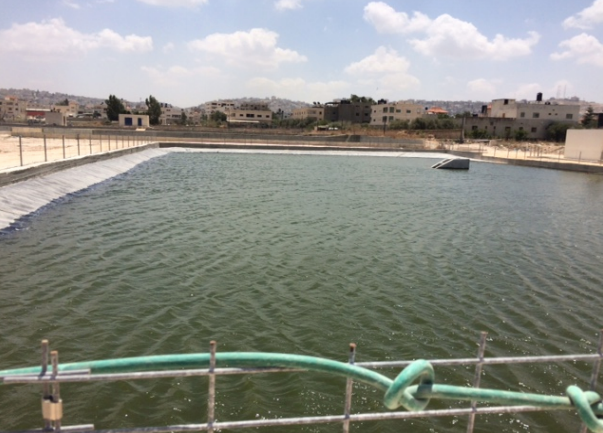(Photo: Earth pond reservoir constructed by ANERA through funding from OFID)
West Bank—In the first effort of its kind in the Palestinian Territories, NEF has established a network of agricultural innovation sites to introduce and adapt the practice of wastewater reuse for agriculture irrigation. NEF’s Greening Jalameh project helps the many Palestinians who depend on farming as their major source of income overcome the scarcity of water resources in the West Bank.
Using wastewater from the Jenin Treatment Plant in the Jalameh Valley, NEF worked closely with Palestinian farmers and the community to demonstrate how treated wastewater can be used safely in agricultural production by connecting them with Israeli wastewater experts and farmers using this practice.
Through meetings with the mayor of Jenin, the Jenin Treatment Plant manager, the local cooperative, and irrigation experts, the project designed and installed a systematic irrigation network to serve surrounding farms. The irrigation system distributes treated wastewater from the Jenin Treatment Plant to 100 hectares—spanning seven farms—planted with varieties of fruit trees.
Starting with an awareness-raising program, NEF introduced techniques to agronomists, local farmers, and community leaders to develop practical, technical, and management guidelines for using wastewater for agriculture on a large scale. NEF organized an intensive training course for Ministry of Agriculture extension staff and other agronomists on the use of treated wastewater. Field visits were arranged to Israeli wastewater treatment facilities and farms irrigated with treated wastewater for the Ministry of Agriculture staff and 80 Palestinian farmers and community leaders. And to foster capacity-building, NEF held workshops for 20 targeted farmers and 25 extension agents from the Ministry of Agriculture on how to apply the practice of wastewater reuse and other agricultural techniques to their farms.
Mohammad Shita, a community leader in the Municipality of Jenin, said he appreciated learning more about the use of treated wastewater—which has often been met with community skepticism due to a lack of information on the safety and benefits of use.
The project resulted in an increase in agricultural productivity, improved income for farmers, additional jobs in agriculture, and increased income reliability from agribusiness.
“It [the project] provided an opportunity to use wastewater—that used to cause pollution—and to treat it and use it for the purposes of irrigation,” Shita said. “The project also provided a great opportunity to plant new irrigated crops, reducing production costs and increasing profits.”
To implement this project, NEF worked in partnership with the Palestinian Center for Research and Development through Development Alternatives Inc.’s USAID-funded Compete Project and collaborated with ANERA and OFID. And to ensure to ensure sustainability of the management and maintenance of the irrigation system, NEF engaged the Marj Ben Amer Cooperative.
To learn more about this project, read ‘Greening Jalameh Final Report’.



